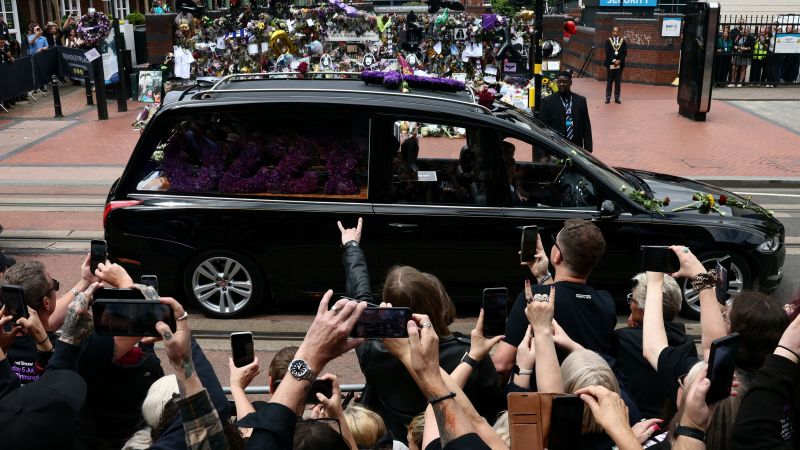In a poignant tribute to one of rock music’s most iconic figures, Ozzy Osbourne, the city of Birmingham, often dubbed the “home of metal,” honored the legendary frontman. Thousands of devoted Black Sabbath admirers gathered on a solemn Wednesday to pay their respects to Osbourne, whose career in music spanned decades and left a significant impact on the genre. The occasion became a heartfelt farewell, marked by a procession as Osbourne’s hearse traversed the streets of the city where he was born and raised, and where Black Sabbath was formed in 1968.
As the hearse made its way down Broad Street, Birmingham’s bustling thoroughfare, onlookers and fans gathered, chanting in unison, “Ozzy, Ozzy, Ozzy, oi, oi, oi,” providing a fitting tribute to the man known as the “Prince of Darkness.” The procession culminated at the Black Sabbath bench, established in 2019 on the Broad Street canal bridge, a site now synonymous with the band’s legacy. Following the hearse were six vehicles, transporting the Osbourne family, who were deeply moved by the outpouring of affection from the public.
Among those paying their respects was long-time fan Antony Hunt, who expressed the emotional weight of the day and highlighted the diverse range of fans who came out to honor Osbourne. He noted the attendance of individuals of all ages—from young children to those in their 60s and 70s—showcasing the wide-ranging influence of the rock icon. The death of Ozzy Osbourne, announced just days prior, sparked a surge of pilgrimage from fans to various significant sites throughout Birmingham, a city that takes pride in its historical association with heavy metal.
City official Zafar Iqbal echoed the sentiments of many when he remarked, “Ozzy was more than a music legend – he was a son of Birmingham.” Acknowledging the importance of such a moment for fans, he highlighted the personal connection many had with Osbourne and how the city collectively mourned the loss. The late rocker and his bandmates—Terence Butler, Tony Iommi, and Bill Ward—had recently been bestowed the Freedom of the City, an acknowledgment of their immense contributions to the cultural tapestry of Birmingham.
The origins of Black Sabbath trace back to Birmingham in 1968, where Osbourne and his fellow band members sought an escape from the monotony of factory life. Their emergence laid the foundation for what would evolve into the heavy metal genre, uniquely characterized by a sound that reflected their industrial surroundings. Through the years, despite his fame, Osbourne remained grounded, with his distinctive Brummie accent serving as a reminder of his humble beginnings.
With their groundbreaking approach, Black Sabbath cemented their status as key architects in the genre of heavy metal, producing an aggressive yet melodious sound that resonated with fans worldwide. Osbourne’s position as the band’s frontman during their peak in the 1970s made him a household name; however, his public persona was marked by wild antics both onstage and off, fueled by a tumultuous lifestyle that often revolved around substance abuse.
The band’s self-titled debut album, released in 1970, resonated with audiences and set the stage for a series of successful albums, including the critically acclaimed “Master of Reality” in 1971 and “Vol. 4” the following year. The band would go on to sell over 75 million albums globally, securing their place in rock history as one of the most influential metal bands of all time.
In recent years, a farewell performance at Villa Park, attended by 42,000 fans, saw Osbourne, amid health challenges, deliver a heartfelt show seated on a black throne. Diagnosed with Parkinson’s disease in 2019, his health issues had been well-documented, but his spirit continued to resonate with fans.
Furthermore, Osbourne’s legacy was revitalized through the reality television series “The Osbournes,” which aired in the early 2000s and attracted a fresh audience, including many who would come to enjoy his music. The show allowed viewers a glimpse into his life with wife Sharon and their children, Kelly and Jack, revitalizing interest in both his music and his persona. Amidst both triumph and tribulation, Ozzy Osbourne leaves behind a rich legacy indelibly woven into the fabric of music history.











